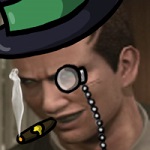|
Babylon Astronaut posted:You could use bronze weapons. A macuahuitl would work too. Iron eating aside, the rust monster would devastate the 2 level 1 pc's it is supposed to be balanced for. More characters should use macuahuitls. The look on a DM's face when you explain your kickass warclub is in no way metallic and is lined with razor sharp, rust-monster-murdering volcanic glass would be wonderful. Also, the word's really fun to say.
|
|
|
|

|
| # ? May 11, 2024 13:53 |
|
Night10194 posted:More characters should use macuahuitls. The look on a DM's face when you explain your kickass warclub is in no way metallic and is lined with razor sharp, rust-monster-murdering volcanic glass would be wonderful. 100% Agreed. Obsidian-lined Greatclubs which can sever horse-heads in a single swing are freakin' amazing.
|
|
|
|
Ferrinus posted:I mean, the distinction between "invisible" and "hidden" goes back to 4E, and I don't really think it's absurd or nonsensical. What's dumb is that it switches mid-rule from narrative natural language (invisible means cannot be seen!) to keyword "hidden," which otherwise conventionally means "can't be seen." Sothe invisible, hidden creature must make an effort and attempt to become keyword-hidden. Unless it's doing that, it's not keyword-hidden, so I guess you can see it? It sort-of makes sense in terms of the Predator's near-invisibility, but in RPGs hiding mechanics trend as either worthless or cloaking devices without much between.
|
|
|
|
quote:Question does is there any details on Ability damage and recovering from it we should know for stuff like the Int Devourer. Greater restoration restores it.
|
|
|
|
Bassetking posted:100% Agreed. Obsidian-lined Greatclubs which can sever horse-heads in a single swing are freakin' amazing. IIRC, according to Dark Sun precedent, those count as long swords. 
|
|
|
|
An interesting take on wizards: only learn Basic spells unless you're in a guild/research it/find someone to teach you. Rules out skeleton shenanigans unless you're really motivated though 
|
|
|
|
moths posted:What's dumb is that it switches mid-rule from narrative natural language (invisible means cannot be seen!) to keyword "hidden," which otherwise conventionally means "can't be seen." Sothe invisible, hidden creature must make an effort and attempt to become keyword-hidden. Unless it's doing that, it's not keyword-hidden, so I guess you can see it? Does it not give you a huge bonus to your hide check? The whole idea behind still having to make one is that you still have a chance to fumble (bump a table and clatter dishes, et cetera) or for someone to see your footprints, hear your footsteps/breath or any other number of ways to perceive someone beyond sight.
|
|
|
|
moths posted:What's dumb is that it switches mid-rule from narrative natural language (invisible means cannot be seen!) to keyword "hidden," which otherwise conventionally means "can't be seen." Sothe invisible, hidden creature must make an effort and attempt to become keyword-hidden. Unless it's doing that, it's not keyword-hidden, so I guess you can see it? It's also up to the DM to bestow her NPCs with the knowledge of the sack of flour trick when the PCs are trying to exploit invis as an undetectable auto-hide.
|
|
|
|
Well I tried and failed to copy/paste the appropriate pile of rules, but the tl;dr is basically that they're self-contradictory enough that "It's a DM's call!" is the only loving way you can use them. They're written with no eye to terms, so you have stuff like "When you come out of hiding to attack..." while you're still hidden. Invisible things can only be detected by their sounds or footprints, so if they're silent and on a non-footprint surface and you pass your perception check...? It's the DM's call!
|
|
|
|
They could also, for example, brush against a member of the party (who happens to be the one who passed his perception check).
|
|
|
|
Bhaal posted:I thought the distinction was always a simple "I can see you" vs. "I know where you are". You can attack something you can't see if you know where it is, penalties notwithstanding. Maybe the following sentiment makes me worthy of taking up a lead designer job at WoTC, but it's up to the DM to give the appropriate roll modifications to hiding/detection when someone is invisible. In the context, clearly the answer here is "bestows Disadvantage."
|
|
|
|
EDIT: ^^^^ Yes, I'd say adv/disadv would fit there and is a clever tool for giving powerful but not overbearing wiggle room in tipping the scales of an otherwise very structured resolution mechanic. There's also breathing, heartbeat, body heat, body odor, the list goes on. While 5e deserves its share of ire and while they probably added to the confusion with poor wording for this, the relationship between invis and hiding has always had one foot in the doorway of DM fiat. There are situations where you just won't be detected with it, there are situations where it just won't save you. That one is always going to find ways to jump out of the rails of any rule system. Bhaal fucked around with this message at 00:41 on Sep 18, 2014 |
|
|
|
Tactical Bonnet posted:They could also, for example, brush against a member of the party (who happens to be the one who passed his perception check). An non-hidden invisible thing, on the other side of the room, can be hit with a crossbow (with disadvantage) or Magic Missile (automatically hitting). e: Being Invisible confers no bonus to your hide check. (That I can find, anyway.) moths fucked around with this message at 00:45 on Sep 18, 2014 |
|
|
|
Now that's ridiculous, how on earth does being invisible not help you hide?
|
|
|
|
Tactical Bonnet posted:Now that's ridiculous, how on earth does being invisible not help you hide? It lets you make the hide check regardless of any other circumstances, that's how it helps. It works much the same in 4e, though it's a bit more codified there.
|
|
|
|
I may be mixing up game systems but didn't invis use to grant 100% concealment, which was a mechanic that gave you bonuses to AC and/or the DC needed to detect you?
|
|
|
|
Bhaal posted:I may be mixing up game systems but didn't invis use to grant 100% concealment, which was a mechanic that gave you bonuses to AC and/or the DC needed to detect you? In 4e invisibility granted you Total Concealment; that meant a -5 penalty to attacks against you and was the requirement to Hide unless you had something specific that let you hide under different circumstances (like the Cunning Sneak rogue class feature letting you hide with just Concealment).
|
|
|
|
So invisibility helps you be able to hide and might make you harder to hit, but it doesn't make you harder to find, which is dumb. The fucktarded thing is that there are rules for obscured areas but not for obscured characters. Multiple quotes because hey guess what, the rules are all over the place! PHB. page 177 posted:What Can You See? What does obscured mean? PHB. page 183 posted:A heavily obscured area — such as darkness, opaque fog, or dense foliage — blocks vision entirely. A creature in a heavily obscured area effectively suffers from the blinded condition (see appendix A). A creature operating in darkness is effectively blinded, which means that... PHB. Appendix A posted:Blinded Which still somehow doesn't apply if instead of being blinded, the creature merely can't see you. So anyway, just remember that unless the player pixel-bitches the Invisible Stalker's exact location, you (the DM, with the power) can rule that their attacks simply miss. But don't tell them they looked in the wrong area! PHB. Page 194/195 posted:Unseen Attackers and Targets
|
|
|
|
You're a braver man than I, AlphaDog. Here's the entirety of the Invisible condition: quote:Invisible Which, OK I guess we can extrapolate that an invisible creature is always in a heavily obscured area? What does that mean? quote:A heavily obscured area—such as darkness, opaque So when you're invisible, you're blind. This should actually make the rules-as-physics people happy! Being invisible IRL would mean that light passes uselessly through your retina instead of being processed into usable information. But uh-oh, what's this? • Attack rolls against the (blinded) creature have advantage, and the creature’s attack rolls have disadvantage. • Attack rolls against the (invisible) creature have disadvantage, and the creature’s attack rolls have advantage. e: Missed that you also caught the blind thing.
|
|
|
|
moths posted:You're a braver man than I, AlphaDog. This seems really poorly worded, jesus. Would Invisible posted:For the purpose of
|
|
|
|
I assume from the bolding that Heavily Obscured is meant to be a descriptor applied to multiple things (an area, a creature, etc.) So an Invisible creature is Heavily Obscured, not in Heavily Obscured Area.
|
|
|
|
Grimpond posted:This seems really poorly worded, jesus. Would I can't 100% say I haven't missed something because like I said, the rules for this are everywhere, but as far as I can tell only an area can be "obscured". e: Generic Octopus posted:I assume from the bolding that Heavily Obscured is meant to be a descriptor applied to multiple things (an area, a creature, etc.) I mean yeah, that's what makes sense, but I can't find the part of the rules that lets a creature be obscured.
|
|
|
|
Speaking of the stealth system! Stealth And Combat (And You) If you want to surprise someone at the start of combat, you need to make a Stealth check against their passive perception score. So far, so good. But unlike in previous versions of D&D, Surprise isn't a bonus round where anyone who was able to Stealth gets a free mini-turn, but is instead a penalty applied to people who didn't have a high enough Passive Perception to beat their enemy's stealth score, and they're effectively stunned for the first round. What this means as a practical matter is that it's almost impossible for large groups to hide, because every member of the group needs to beat the passive perception scores of the people they're hiding from; if anyone flubs their Stealth check then everyone on the opposing team has seen an enemy, which means they're no longer surprised. It also means as a practical matter that ambushes in the game are nearly impossible for groups (say, Kobolds or Goblins) to pull off, because even with a good stealth score the chance of one of them flubbing the roll gets pretty high pretty fast. So far, so good, and fairly clear. But the D&D guidelines in the only official published adventure so far (namely, the Starter Box) contradict this completely. They tell you to make a single roll for the entire group, and then compare that to the party's passive perception scores. This means that ambushes are very likely to be all or nothing affairs, because the variance between passive perception scores is only 2-3 points. It also makes ambushes something that's remotely possible to happen, although with how rocket tag-y low level combat is (again) it also means that you can potentially TPK the party very easily. But the real question is - which is the real stealth system? Do you go with the one that makes them almost impossible and screws over the stealth player (individual rolls), or the one that makes them very common (group roll)? Do you edit the system so it only requires half the group beat their passive perception to get a surprise round? Average everyone's stealth score and just roll once? The world may never know.
|
|
|
|
Uh RPZip Hoard of the Dragon Queen is out, that's an official published adventure.
|
|
|
|
RPZip posted:Speaking of the stealth system! The basic rules say there are group checks. Were if half the party makes it they all make it. Group check posted:Group Checks There is also the option of certain members of the party surprising the enemies but not the entire party. quote:Otherwise, the DM compares the Dexterity Meaning that even if half the party is not hiding you can still get surprise. It's just only the members that were hiding get it. MonsterEnvy fucked around with this message at 02:43 on Sep 18, 2014 |
|
|
|
Generic Octopus posted:So an Invisible creature is Heavily Obscured, not in Heavily Obscured Area. There unfortunately aren't rules for a creature being Heavily Obscured. That I can find. Invisible and Hiding look like they're this system's 3e Grapple or 4e's at-launch Stealth rules. It's all a cross-indexed clusterfuck that's only practical use is in citing rules, citing different rules, arguing even worse written rules, and taking advantage of the liberal use of the word "hiding" in it's conventional (not keyword/conditional Hiding) and "cannot be seen" (not Detecting or Perceiving). Whoever's best at weaving the amateur rules peninsulas involving footprints and smells into a rich tapestry of game-bogging RAI vs RAW rules-slaw bullshit wins the pissing contest, unless that person isn't the DM, who can point to a hundred precedent tweets saying it's ultimately his call. e: but that absolutely feels like D&D, good loving job Mike. moths fucked around with this message at 02:43 on Sep 18, 2014 |
|
|
|
They do have a "group check" feature where everyone rolls whatever skill check, and if at least half of the group succeeds, then the whole group succeeds. They are really sketchy on when and where it is to be used, though (I guess it's up to you know who). The example they give is rolling Survival to go through a harsh environment. If enough of the group passes their check, you can assume they were able to help the others along with food, shelter, don't eat those berries, that is quicksand step around it, etc. For a group stealth check, I dunno if it really holds under that mechanic. I have visions of the scooby gang doing the hunched over, synchronized tip-toeing routine. Edit: loving beaten
|
|
|
|
There was some additional [PRO GAME DESIGN] where if any member of one group could detect any member of the other group, all stealth was off.
|
|
|
|
moths posted:There unfortunately aren't rules for a creature being Heavily Obscured. That I can find. I'm saying the rules text you quoted is meant to be a rule for Heavily Obscured, in general, and describes the effects in the context of a heavily obscured area.
|
|
|
|
...which you're told to consider the invisible creature as being.
|
|
|
|
So it seems it's basically up to the stealthers to decide whether it's worth helping the rest of the clods try to get surprise with a group check or they should just split off and to get a better chance at securing surprise for themselves. Then again, splitting off also means they won't get the extra help perceiving enemies if the clods happen to be good at that, so tradeoffs. The referrals in the book are really pretty bad, I remember seeing the DW authors doing character creation and commenting on how they were sent all over the book in a questionable order, and never referred back. That it flowed all wrong.
|
|
|
|
MonsterEnvy posted:The basic rules say there are group checks. Were if half the party makes it they all make it. That's not an option, it's the sole way to determine surprise as per the surprise rules in the rulebook. PHB page 189 posted:The DM determines who might be surprised. If neither side tries to be stealthy, they automatically notice each other. Otherwise, the DM compares the Dexterity (Stealth) checks of anyone hiding with the passive Wisdom (Perception ) score of each creature on the opposing side. Any character or monster that doesn’t notice a threat is surprised at the start of the encounter. If you ’re surprised, you can’t move or take an action on your first turn of the combat, and you can ’t take a reaction until that turn ends. A member of a group can be surprised even if the other members aren't. That's what's listed in the combat chapter under the heading "Surprise". Individuals can be surprised even if the dude next to them isn't. The other part you kind-of quoted is "group checks" under "ability checks", which reads, in full: PHB page 175 posted:Group Checks This is not in the combat chapter under the heading "Surprise". A reasonable person would not assume that these rules somehow supersede the combat-specific rules in the combat chapter. Look, this quote:they’re most useful when all the characters succeed or fail as a group is in direct conflict with this quote:the DM compares the Dexterity (Stealth) checks of anyone hiding with the passive Wisdom (Perception ) score of each creature on the opposing side [quote]
|
|
|
|
AlphaDog posted:Look, this Yeah, it's annoying that the rules conflict with each other there. I mean, "the DM can fix it" but goddamn.
|
|
|
|
moths posted:...which you're told to consider the invisible creature as being.
|
|
|
|
Stealth rules are the best example of Mearls being equally full of and a piece of poo poo, because they were very obviously written to be clear and concise, but were written so awfully and nonsensically that Mearls is now desperately trying to claim they're this vague "DM Decides" handwavey thing as an excuse for the rules not actually working in any way.
|
|
|
|
Honestly I think that if I were the DM of an invisible player I wouldn't even make them roll hide unless they were literally right in front of the person they were hiding from, and maybe only then if the person was actively patrolling. If he's just standing guard at a gate or whatever then you could pretty much do anything short of slap him and get away with it.
|
|
|
|
Still gotta stay quiet and conceal your scent or footprints or whatever even if you're invisible. Giving a freebie just because someone cast a spell that solves some of the problems of sneaking is what makes everyone else feel redundant. Something I see the rules trying to do is make utility magic better at supporting specialists than replacing them, which is what a lot of people complain about spells doing.
|
|
|
|
So basically Invisibility is just "I have Heavy Obscuration even when there is nothing that would otherwise provide it" ...? I think people are expecting "Heavily Obscured" (invisible or not) to impose some sort of penalty to perception on the perceivers. But it doesn't; it just allows you to become hidden. But what does hidden do...?  I mean, blinded/invisible already does this: moths posted:• Attack rolls against the (blinded) creature have advantage, and the creature’s attack rolls have disadvantage.
|
|
|
|
P.d0t posted:What does being hidden add? Am I missing something here? Things have to guess where you are to attack you.
|
|
|
|

|
| # ? May 11, 2024 13:53 |
|
slydingdoor posted:Still gotta stay quiet and conceal your scent or footprints or whatever even if you're invisible. Giving a freebie just because someone cast a spell that solves some of the problems of sneaking is what makes everyone else feel redundant. Something I see the rules trying to do is make utility magic better at supporting specialists than replacing them, which is what a lot of people complain about spells doing. I was assuming that the wizard isn't a total fucko and used the spell to make the person who sneaks better at sneaking. "Between your skills at sneakthievery and also being invisible there is rougly zero chance of you being seen."
|
|
|



























